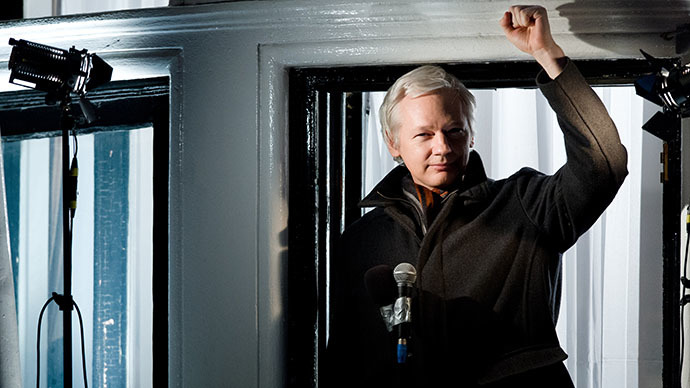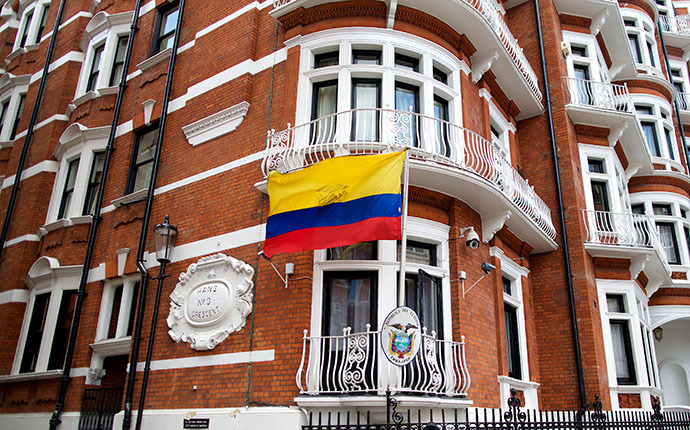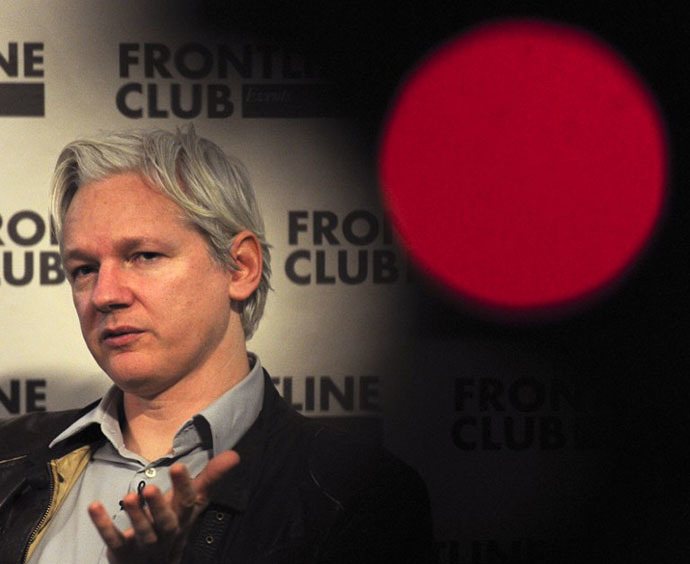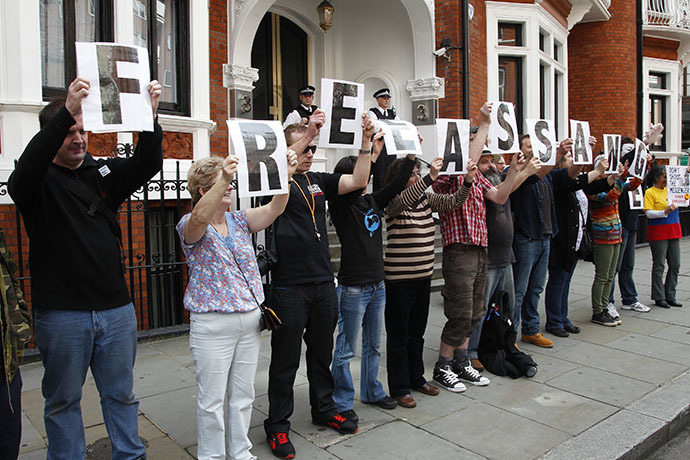‘God’s Lonely Man’: Assange’s years of purgatory

The fortunes of Julian Assange provide a salutary lesson in how political dissidents are often successfully marginalized, de-legitimized, and isolated by governments when they start to have a serious impact.
The founder and public face of WikiLeaks, responsible for revealing state, diplomatic, and military secrets of governments – especially the US government – on a grand scale, has gone from being lauded as a hero within the progressive community to being vilified as a rapist doing his utmost to avoid justice.
In June 2012, Assange approached Ecuador for political asylum after the Swedish authorities made a successful request for his extradition from the UK. His request for asylum was granted by the Ecuadorian government and since then Assange has been holed up in the Ecuadorian Embassy in London, existing in a status of limbo with no solution in sight. There he occupies a small office, where he sleeps, exercises, eats – and exists. There he remains abandoned by many of the same progressives, socialists and liberals who have extended themselves in campaigns lauding and supporting Chelsea (Bradley) Manning and Edward Snowden, other whistleblowers of note.

There is nothing like an accusation of rape when it comes to destroying a man’s reputation and character. The accusation alone carries with it a mark of shame that can never be completely eradicated. This is not to suggest that such accusations should not be taken seriously. They should be taken very seriously – always. But when they are made under the particular circumstances they were against Julian Assange – i.e. by two women who admitted engaging in a consensual sexual relationship with him, and when a Grand Jury investigation into Assange in the United States is still live, meaning that he faces the real prospect of being extradited to a country with the prospect of spending many years in prison for his role in exposing US dirty secrets and war crimes in places like Iraq – then surely alarm bells start ringing.
Judging by the demonization mounted by leading liberal commentators and columnists in the UK, however, Assange is a shyster using his work with WikiLeaks as justification for his refusal to face justice.
Prime among those columnists and commentators is Owen Jones, currently the acceptable and public face of left-wing opinion within the UK mainstream. In August 2012, Jones penned an article for the UK’s Independent newspaper, titled “There should be no immunity for Julian Assange from these allegations.”

Yet no one, least of all Assange, has ever demanded that he receives immunity. What he requested from the outset is a guarantee from the Swedish authorities that if he agrees to travel to Sweden to answer the allegations, he won’t be extradited to the United States. Could anyone, knowing what we know about the fate to befall Chelsea Manning – sentenced to 35 years imprisonment in 2013 for leaking information to WikiLeaks – seriously argue that he won’t be at risk of extradition to the US from Sweden otherwise?
Naomi Wolf, a prominent American writer, feminist and social commentator, has argued from the outset that the rape allegations that have been made against him bear all the hallmarks of a set-up.
Here we must take a moment to debunk the myth that Sweden is a social democratic utopia built on a foundation of a progressive and humane legal system, when compared to the UK and other developed nations. On the contrary, Sweden’s record when it comes to extraditing people to other countries and its cooperation with the US in extraordinary renditions is a damning one. It was the subject of a 2013 report by Amnesty International. Incidentally, Amnesty also supports Julian Assange’s request for an assurance from Sweden than he won’t be extradited to the US if he agrees to travel to the country to face the aforementioned rape allegations.
The Guardian newspaper, a one-time supporter and collaborator of Julian Assange, then turned against him when the Australian whistleblower withdrew his cooperation with the newspaper. Profiting enormously from its association with the WikiLeaks founder, the Guardian journalists who worked with Assange on the leaks went on to write a book for the newspaper, and The Guardian sold the rights to Hollywood on WikiLeaks and Julian Assange without either his permission or cooperation. Assange did not receive a penny from either the book or the sale of the movie rights.

One man who has not wavered in his support for Assange is John Pilger, an internationally respected and award-winning investigative journalist of many years standing. Pilger has described the smearing of Assange as “shameful” and the case against him as an “assault on freedom and a mockery of journalism.”
It was the American novelist Thomas Wolfe who coined the phrase “God's Lonely Man.” It first appeared as the title of an essay he wrote, in which he argued that loneliness is the universal yet unspoken fate of all in society. Wolfe writes: “The whole conviction of my life now rests upon the belief that loneliness, far from being a rare and curious phenomenon, is the central and inevitable fact of human existence.”
The theme of the isolation and the loneliness of the individual in society is one that has been explored continuously. In literature Albert Camus' seminal work “The Stranger,” also titled “The Outsider” (1942), describes the alienation of the novel's protagonist Meursault before, during and after he kills a man in self-defense. In first-person narrative, the reader is introduced to Meursault being notified of his mother's death. He attends the wake but refuses to view the body when offered the chance. Later he attends the funeral, but does so absent of any of the conventional emotions associated with bereavement. When standing trial for killing the man in self-defense, he likewise betrays no emotion, as if passively accepting his fate.
Meursault's crime in the eyes of society isn't so much that he killed a man, but that he demonstrated no emotion or remorse either in the aftermath or before when attending his mother's death. This lack of emotion bespeaks a refusal to conform, an abnormality, thus marking him out as a threat to the system and its moral verities.
Taken in context, then, Julian Assange has provided the world with a glimpse of an empire in decline. More, he has provided it with a warning of the grim consequences if, like Camus' Mersault, it remains passive in the face of the crimes and violations of human rights it commits on a daily basis in a desperate and cynical attempt to maintain its fading hegemony.
This is why at this moment, sitting in the Ecuadorian embassy in London contemplating his fate, the founder of WikiLeaks is indeed God's Lonely Man.
The statements, views and opinions expressed in this column are solely those of the author and do not necessarily represent those of RT.
The statements, views and opinions expressed in this column are solely those of the author and do not necessarily represent those of RT.













